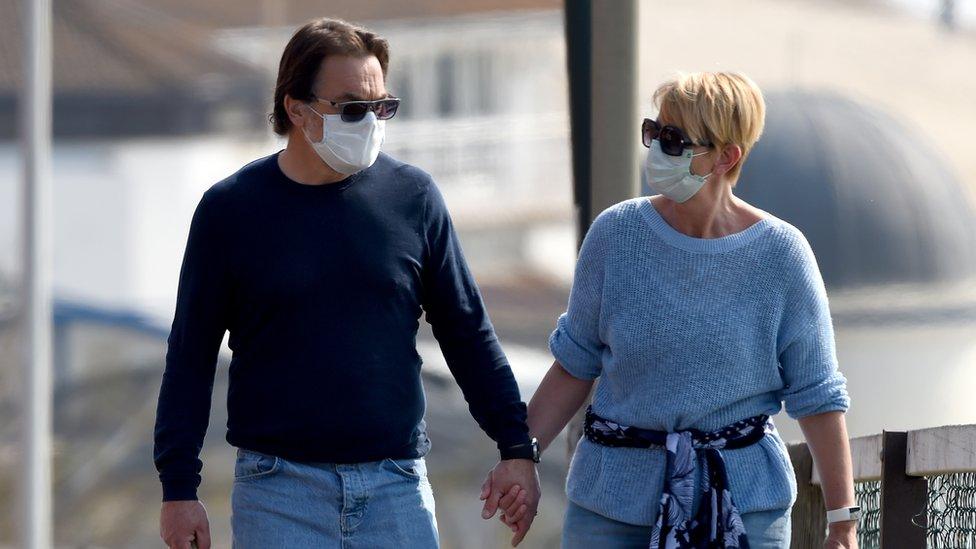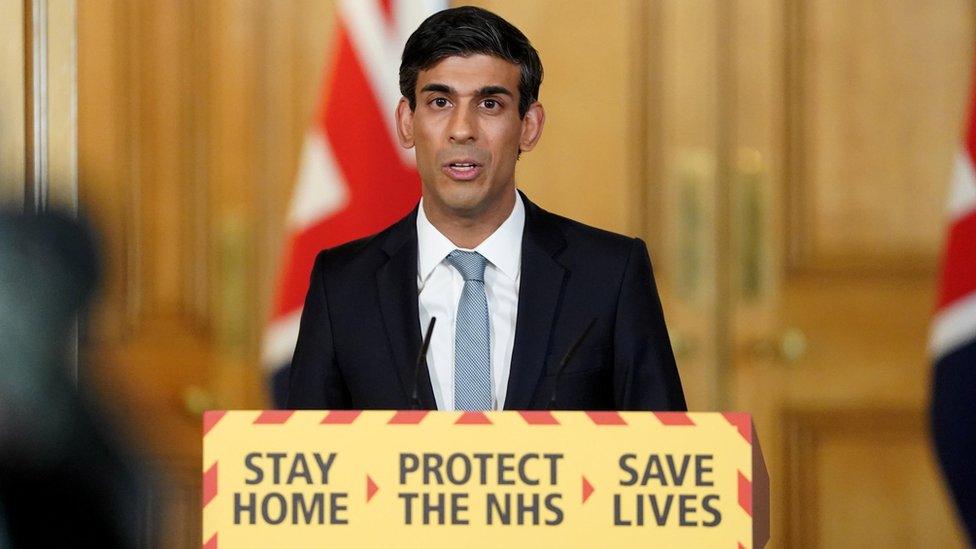Midlanders learning to live with the lockdown
- Published

Lockdownland, where uncertainty goes hand in hand with a brand new language
Another country
Sometimes these days, I feel as though I have emigrated.
I find myself in a new country. Let's call it Lockdownland.
Streets, normally bustling, are deserted and even the most sociable of people are sociably distancing themselves from one another in the name of sociability. It's an ill wind, though, because the city air has never been clearer. Birdsong surrounds us where once we heard only the growl of traffic. Since our arrival in this strange land we have all learnt a new language: who among us had even heard of the dreaded COVID-19 itself until recently?
I was ticked off by one of my old university lecturers the other day for referring to "lockdown" as a single word. I can only imagine what he makes of the relentless use of "plateauing", "ramping-up", "at scale", and, most disturbing of all, "PPE". We would scarcely have imagined that it would be a shortage, not of ventilators and complex drugs, but of basics like gowns and goggles that would be causing such angst for so many of our health, social care and now dental professionals.
"PPE", for goodness' sake!
Quaintly, it used to stand for Politics, Philosophy and Economics at Oxford, that customary gateway to many a glittering political career. But in this adopted country of ours, that usage already sounds horribly archaic, hopelessly overtaken by the direst of events.
What this general acceptance of our new vocabulary tells us above all else is that most of us are getting used to our unfamiliar environment. Ministers are said to be surprised at how compliant most people are. Sections of the media have been hinting at some sort of pent-up demand for the lockdown to be lifted sooner rather than later. So far there's precious little evidence of it.

Lockdownland shares a border with Sloganland
No one enjoys feeling stir crazy, of course. But I reckon we're so respectful of our invisible enemy that we're reconciled to it. Yes, we'll "Stay Home". There's another new slogan by the way. Presumably the "at" between "Stay" and "Home" wouldn't have fitted on the podiums during those ratings-topping Downing Street briefings.
Politics By Numbers
"The first rule of politics is to be able to count." So said the 36th U.S. President, Lyndon B Johnson.
You can be sure his British namesake will be doing the sums as he contemplates not just how he personally, but also how this country itself, can return to anything remotely like business as usual. And it's not just the harrowing numbers on death rates, hospital admissions and new cases that he and his colleagues will be poring over.
According to a recent poll by YouGov, the extension of the lockdown by a further three weeks was supported by 91% of Midlanders, with 61% saying they "strongly supported" it. These numbers will no doubt figure heavily in what is, for the Government, a political calculation. However much they may assure us they are being "led by the science", those of us who followed the Brexit debate need no reminding how cavalier politicians can be about heeding or ignoring "the experts" whenever it suits them.
Quite apart from his own brush with the coronavirus, the prime minister, who was conspicuously reluctant to introduce the lockdown in the first place, is now apparently among those prepared to play it long.

In Lockdownland, the debate over hot and cold has nothing to do with the national dish
This goes to the heart of the debate in the Government between the "Hots" (those most troubled by the economic damage who want the lockdown eased sooner rather than later, even if it means "running the NHS hot") and the "Colds" (those including the PM who now consider the risk of a second peak later this year to be an even greater threat to lives and livelihoods).
The education secretary, the South Staffordshire MP, Gavin Williamson, is believed to be in the "hot" camp. He told last Sunday's Downing Street briefing that he would love to see children back in their schools by 11 May, as predicted in that morning's papers. He then proceeded to dismiss the very idea out of hand.
No wonder there is mounting pressure on the Government as our "hybrid" or "virtual" Parliament Zooms into action: "It's life but not as we know it."
Labour's new Leader, Sir Keir Starmer, will urge ministers to resolve that debate between the "Hots" and the "Colds" by publishing a lockdown exit strategy. And senior Conservatives including the former leader Iain Duncan Smith warn that the Government's single-minded determination not to dilute the "Stay Home, Save Lives, Protect the NHS" message risks "insulting the intelligence of the British people".
What if?
It's a question that's bound to be asked more and more often as these long weeks and months wear on.
"What if people here see other countries relaxing their lockdowns?" Would public support for the lockdown start falling away?
"What if the recent levelling-off in infection rates, hospital numbers and deaths develops into a sustained improvement?" Would this add to pressure for an early relaxation?
"What if some regions emerge from this emergency faster than others?" Could the restrictions be eased differently in different places? Are we really about to see Brummies descending in their droves on garden centres in Gloucestershire while their local ones remain firmly closed? I suspect not.
But there are already signs that some sections of the community aren't observing the lockdown quite as assiduously as others.

Park life! Or not, as the case may be
Walking round my local park I spoke to several pairs of police officers fighting what one of them called "a losing battle" to break up groups of predominantly young people. "They may be ok if they get it," said one policeman, "but what if they infect their elderly relatives?" This raises obvious concerns in a region with so many concentrations of multi-generation households and where our black, asian and minority ethnic communities appear to be at heightened risk.
What is becoming clear is that those glib assumptions about economic and health issues pulling in opposite directions no longer apply.
As the BBC's economics editor Faisal Islam told us recently, one of the best ways to restore business confidence would be for the lockdown to last long enough to end this emergency once and for all.
As one senior minister said on Tuesday: "We have to find a way of living with it."
That's why we can expect the next three-weekly instalment of the lockdown to introduce modest modifications, allowing some small businesses like shops and garden centres to reopen. Younger, more economically productive people may return to work, especially if some children are able to go back to their classrooms subject to further social distancing restrictions.
What's equally clear, though, is most of us will still have no idea when we'll have our hands on our passports to make our escape from Lockdownland.

A SIMPLE GUIDE: How do I protect myself?
AVOIDING CONTACT: The rules on self-isolation and exercise
LOOK-UP TOOL: Check cases in your area
VIDEO: The 20-second hand wash

